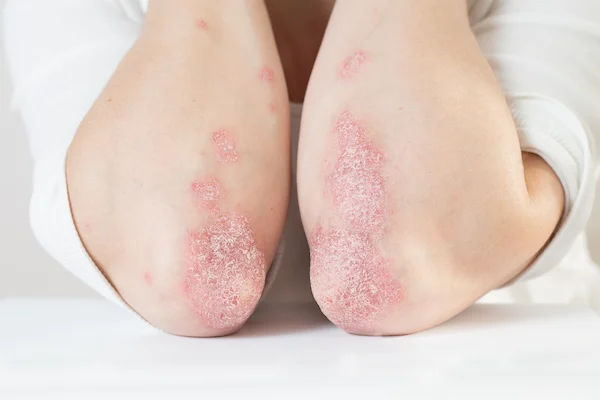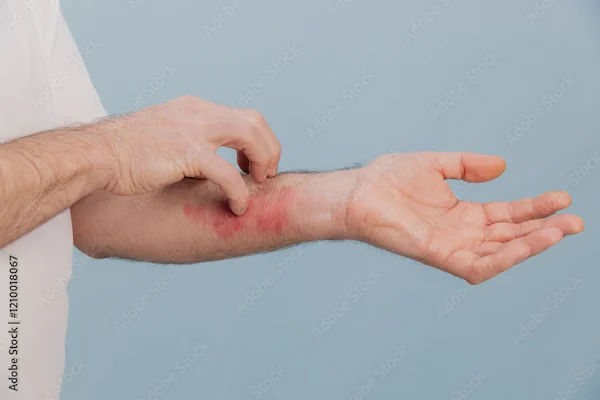Is Psoriasis Contagious? Common Misconceptions And Facts Explained
Is psoriasis contagious? Learn the facts about psoriasis, its causes, and why it cannot spread from person to person. Break the stigma with accurate information.

Written by Dr Sonia Bhatt
Last updated on 13th Jan, 2026
If you’ve been diagnosed with psoriasis or know someone who has it, you may have wondered whether the condition is contagious. The idea that psoriasis can spread through physical contact with someone who has the disease is a common misconception. This article will address the question, “Is psoriasis contagious?”, explain how the condition develops, and provide clarity about its transmission and preventive measures.
Understanding the true nature of psoriasis can help reduce stigma and promote a better understanding of this chronic skin condition. By the end of this article, you will have a clear understanding of whether psoriasis can be passed from person to person, and how best to manage and support those living with the condition.
What is Psoriasis?
Psoriasis is a chronic autoimmune disorder that speeds up the skin cell turnover process. Under normal circumstances, skin cells grow, mature, and shed over the course of a month. However, in individuals with psoriasis, this process happens too quickly—within a few days—causing skin cells to build up and form scaly patches or plaques. These plaques are usually red, inflammatory, and covered with silvery scales.
Psoriasis can appear anywhere on the body, including the scalp, elbows, knees, back, and hands. While the condition is lifelong and chronic, it can often be managed with proper treatment and lifestyle changes.
Is Psoriasis Contagious?
No, psoriasis is not contagious. Unlike some skin conditions such as athlete's foot or impetigo, psoriasis cannot be passed on through direct contact with an affected person. It is not caused by a bacterial, viral, or fungal infection, and it cannot be transmitted by touching, hugging, kissing, or sharing personal items like towels or razors.
This is one of the most important pieces of information to understand when it comes to psoriasis. It’s easy for people to feel embarrassed or isolated due to the visible plaques on their skin, but it’s crucial to know that psoriasis cannot spread through casual or close contact with others. The condition arises from an overactive immune system, which is not contagious.
What Causes Psoriasis?
Psoriasis develops due to a combination of genetic and environmental factors. Here’s a closer look at what contributes to the development of psoriasis:
1. Genetic Factors
A person’s likelihood of developing psoriasis increases if they have a family member who also has the condition. Researchers have identified specific genes related to the immune system, such as the HLA-Cw6 gene, that are associated with an increased risk of psoriasis. If someone in your family has psoriasis, your risk may be higher, but it’s important to note that not everyone with a family history will necessarily develop the condition.
2. Immune System Dysfunction
Psoriasis is considered an autoimmune condition, meaning that the body’s immune system mistakenly attacks healthy skin cells. T-cells, which are supposed to help protect the body from infection, become overactive and trigger inflammation in the skin. This leads to the rapid production of new skin cells that pile up on the surface, forming plaques.
3. Environmental Triggers
Environmental triggers can play a significant role in causing flare-ups or the initial appearance of the condition. Some common triggers include:
Stress: Emotional or physical stress can exacerbate psoriasis symptoms and may even trigger the onset of the disease.
Infections: Certain infections, especially strep throat, can trigger a psoriasis flare-up in genetically predisposed individuals.
Skin injuries: Cuts, burns, and insect bites can lead to the development of psoriasis at the site of the injury (known as the Koebner phenomenon).
Medications: Certain medications, like lithium or beta-blockers, can trigger or worsen psoriasis symptoms.
Weather: Cold, dry weather can dry out the skin and trigger flare-ups.
These factors contribute to the onset and progression of psoriasis, but none of them makes psoriasis contagious.
Why Do People Think Psoriasis is Contagious?
The misconception that psoriasis is contagious likely stems from the visible nature of the condition. The red, scaly plaques that appear on the skin can resemble an infection or a fungal condition, which can be spread from person to person. Additionally, many skin conditions, such as athlete’s foot or ringworm, are contagious, so it’s understandable that people may mistakenly associate psoriasis with these conditions.
However, despite these superficial similarities, psoriasis is fundamentally different. It’s a genetic, immune-mediated disease, not a contagious infection. People living with psoriasis should not feel the need to hide their condition or isolate themselves due to fear of spreading it.
Psoriasis and Social Stigma
Even though psoriasis is not contagious, individuals with the condition may still experience social stigma or discrimination. This is often due to the visible nature of the symptoms, which can make people feel self-conscious or embarrassed. Common challenges that people with psoriasis may face include:
Social discomfort: People may avoid social situations because of the appearance of their skin or the misconception that others may be uncomfortable around them.
Psychological impact: Living with a visible chronic condition can lead to feelings of low self-esteem, anxiety, or depression. The social stigma surrounding psoriasis can exacerbate these emotional challenges.
For individuals living with psoriasis, it’s essential to educate friends, family, and colleagues about the non-contagious nature of the disease. Understanding and compassion can go a long way in reducing social stigma and helping individuals with psoriasis feel more accepted and supported.
Scientific Explanation of Non-Contagious Nature
There are many myths and misconceptions about the question, 'Is psoriasis contagious?' One common belief is that psoriasis can spread through physical contact. However, here’s the scientific explanation for why psoriasis is not contagious.
Underlying Cause:
Psoriasis is a non-contagious autoimmune condition, meaning it cannot be spread through physical contact, air, or sharing personal items. It occurs when the immune system mistakenly attacks healthy skin cells, causing them to grow and regenerate at an accelerated rate. This malfunction is driven by genetic and environmental factors, not infectious agents like bacteria, viruses, or fungi.
Genetic Predisposition:
Psoriasis has a strong genetic component. People with a family history of psoriasis are more likely to develop the condition, but inheriting these genes alone doesn’t guarantee the disease. Environmental triggers like stress or infections often activate it in genetically predisposed individuals. This makes psoriasis an internal immune disorder, not a communicable disease.
Absence of Pathogenic Microorganisms:
Unlike contagious diseases caused by bacteria, viruses, or fungi, psoriasis is not linked to infectious microorganisms. The lesions result from the body's immune response, not an infection. This means there’s no way for psoriasis to be transmitted to others through touch, proximity, or bodily fluids.
Conclusion
It’s important to understand that psoriasis is not contagious. The condition is caused by genetic factors and immune system dysfunction, not by bacteria, viruses, or fungi. People living with psoriasis should not have to worry about spreading the condition to others.
Unfortunately, social stigma and misconceptions about psoriasis still exist, but education is key to eliminating these misunderstandings. If you or someone you know has psoriasis, it’s important to share the facts about the condition to help reduce misconceptions. With proper treatment and support, individuals with psoriasis can live normal, healthy lives without fear of transmission.
Consult Top Dermatologists
Consult Top Dermatologists

Dr. S Madhuri
Dermatologist
10 Years • MBBS, MD. DVL, DNB, Fellow (Dermatosurgery & Lasers)
Secunderabad
Apollo Hospitals Secunderabad, Secunderabad
(450+ Patients)

Dr. Aishwarya Malladi
Dermatologist
3 Years • MBBS, MD (Dermatology)
Chinagadila
Apollo Hospitals Health City Unit, Chinagadila
(100+ Patients)

Dr. Kaushiki Hajra
Dermatologist
5 Years • MBBS, MD Dermatology, Venerology & Leprosy
Kolkata
MCR SUPER SPECIALITY POLY CLINIC & PATHOLOGY, Kolkata

Dr. Sushil Singh
Dermatologist
6 Years • MBBS, MD Dermatology, Venerology & Leprosy
Kolkata
MCR SUPER SPECIALITY POLY CLINIC & PATHOLOGY, Kolkata

Dr. Shilpa Nikam
Dermatologist
8 Years • MBBS, DDVL, PGDMC
Bengaluru
A1 AESTHETIC Skin and Hair Clinic, Bengaluru
(25+ Patients)


